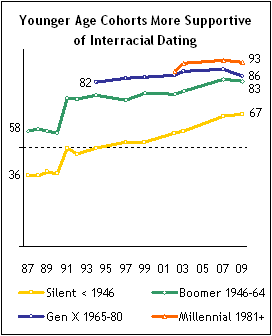It seems that every successive generation of Americans has to have a name or label. I’m sure you’re already familiar with the “Baby Boomer” generation that was born in the two decades after World War 2. Most have presumably also heard of “Generation X” (to which I belong), who were born between 1965 and 1980.
Most recently, we have the “Millennial” generation — those born between 1981 and 2000. Growing up in the age of computers, the Internet, cellphones, social networking, and multimedia proliferation, in many ways the Millennials represent a milestone generation within American society. To capture and describe some of their characteristics, the Pew Research Center recently conducted a series of reports on various demographic and cultural traits and attitudes of this generation. Below are some highlights of their report that relate to the cultural and racial/ethnic views and composition of the Millennial generation:
They are the most ethnically and racially diverse cohort of youth in the nation’s history. Among those ages 13 to 29: 18.5% are Hispanic; 14.2% are Black; 4.3% are Asian; 3.2% are mixed race or other; and 59.8%, a record low, are White.
They are starting out as the most politically progressive age group in modern history. In the 2008 election, Millennials voted for Barack Obama over John McCain by 66%-32%, while adults ages 30 and over split their votes 50%-49%. In the four decades since the development of Election Day exit polling, this is the largest gap ever seen in a presidential election between the votes of those under and over age 30. . . .
They are the least religiously observant youths since survey research began charting religious behavior. . . .
The graph shows the percentage approving of interracial dating for each of four cohorts (or generations), tracking their responses across the 13 separate waves of polling between 1987 and 2009. Several things are evident from the graph. One is that there is an upward trend in acceptance of interracial dating in most cohorts as time passes. . . .
Another conclusion from the graph is that each younger cohort is more supportive than the cohorts that preceded it. Baby Boomers were more supportive in 1987 than members of the Silent Generation, and remained that way throughout. Generation X (at 82%) was more supportive than the Baby Boomers when it first appeared in the surveys. And the Millennial cohort is the most supportive of all.
The part of the Pew reports about the racial/ethnic composition of the Millennials was not surprising, although I expected the proportion Asian American to be a little higher. Nor am I surprised that the Millennials tend to be the least religious of all the generations, although I expect their levels of religious participation to increase as they get older.
I am also not surprised that the Millennials are the most supportive of interracial dating, as the graph illustrates. However, in looking at the graph, it shows that somewhere around 2007, the approval rates for interracial dating actually declined slightly for Baby Boomers, Generation X, and the Millennials. Further, at this point, we do not yet know whether the approval rate for interracial dating will continue to decline, or whether it will rebound and continue its upward trajectory.
I find this recent development a little perplexing, particularly considering that was when Barack Obama, the child of an interracial couple, began his rise in popularity on the way to the Presidency. I am left to wonder, could it be due to the subtle rising White backlash against the increasing levels of racial/ethnic diversity in this country?
In other words, as I’ve written about before, starting even before Barack Obama’s rise in popularity and even accelerating ever since, there were indications, events, and incidents that showed how racial/ethnic relations in the U.S. were becoming increasingly polarized, with a rising group of White Americans increasingly feeling resentful and threatened by such demographic and cultural changes taking place in “their” community and “their” country.
If that is indeed the case, the Millennial generation indeed represents a watershed moment in the evolution of American society. On the one hand, they might replicate the racial/ethnic and cultural splintering of the country that may lead to the de facto split of American society into a White part and a non-White part. On the other hand, the Millennials have the opportunity to draw upon their shared institutional beliefs and cultural practices and help the country heal its racial/ethnic divides and lead us toward coalescing into a true multicultural nation.
I believe that this will be the primary challenge — and ultimate legacy — of this Millennial generation.

